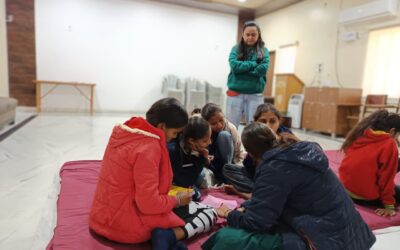“I think women’s tolerance to male entitlement has come down as compared to our mothers’ generation”, said Rohini* sitting on one side of the canal. We were five India Fellows who had come to this beautiful village called Noor* for our rural immersion. Two other fellows sitting across her on the other side of the canal, readily agreed. The clear fresh water was flowing below our feet; the field to our right was swaying in the gentle breeze. The cattle egret (at least that’s what we guessed) was flying across the fields.
Rohini mentioned the long discussion with her mother, who could not understand Tapsee’s course of actions in the movie ‘Thappad‘. (The film is a story of a couple where, in one instance, the husband takes out his work pressure on his wife by slapping her. It is about a woman who is fighting for her self-respect and contemplating what is fair.)
I was lying on the same side of the canal with my hands over my head, looking up at the cloudy sky. Listening to this conversation, I was reminded of one scene from the movie. On the next day of the incident, Tapsee confines herself into one corner of the living room, wrapping her head around what had happened. She then noisily moves the furniture back to its place. I remember thinking that some things can go back to how they were, but not all.
My trail of thoughts was cut by what Vidya*, another co-fellow, told about how she personally would still give time to the relationship and try to work on it. Sitting on a stone slab put across the sides of the canal, she went on to say that there were definitely some actions that were not okay, which are deal-breakers.
As we were talking, we noticed bitter gourds coming down the running water in the canal. We had seen a few vegetable vendors by the side of the road dipping the whole jute bag of their vegetables into the running water for cleaning it. Rohini thought that they might have dropped a few of the bitter gourds while cleaning.

She brought us back to the conversation then, pointing out that the fact we have a deal-breaker is us basically lowering our tolerance levels. We have the choice of prioritising our self-worth. Vaibhav*, who had been listening to this conversation for a while now, said something which really stroked us. He said that the stories of our mothers or other women in our families might have made women realign their priorities. Through the years, women have learned to put their self-worth, dreams and mental wellbeing at the forefront.
That made sense because I have heard multiple stories from the women in my life about how patient they were of the comments/insults thrown at them, the roles they were reduced to and how proud they (or some of them) were, of adapting to it. Probably that’s why most of them don’t understand Tapsee’s character in the movie when she switches off after ONE slap. Or probably that’s why only a few of them could empathise with her.
I have often heard women being compared to Mother Earth for their patience and tolerance. Indian women have been conditioned to believe that silent suffering and sacrifice are illustrative of our inner strength. We have been celebrated when we quietly writhe in agony. Whenever we defy society’s expectations and stand up for ourselves, we are disdained.
It has taken us generations to understand our place in the relationship dynamics, unlearn society’s conditioning and hold fast to our place without any guilt. We have understood that dreams have no gender and that there is nothing wrong in wanting to realise them without getting subsumed by our partner’s dream. I am happy that our generation is at that point where we understand the importance of discussing the priorities, deal-breakers and making the choice of how much is too much.
I was brought back from my thoughts when Pranav exclaimed about how he understands love between his sister and brother-in-law. Still, he can never know why she should suffer silently when he comes back home drunk and beats her up. Not sure why but I had a smile lingering on my face when he finished narrating the story. I was glad that he understands how wrong this is, and that as a society, we try to shed our conditioning and let go of old narratives.
We shared the stories related to the topic, and after a point, we all just went into our own thoughts. When I close my eyes to think of Noor, I will think of this place, this moment and these people I was with. After a few minutes, Rohini mentioned the time and that we should return soon. On the way back, we walked together, side by side!
*Name changes to maintain confidentiality




Brilliantly written ma’am.
Brilliant narration! Loved it!